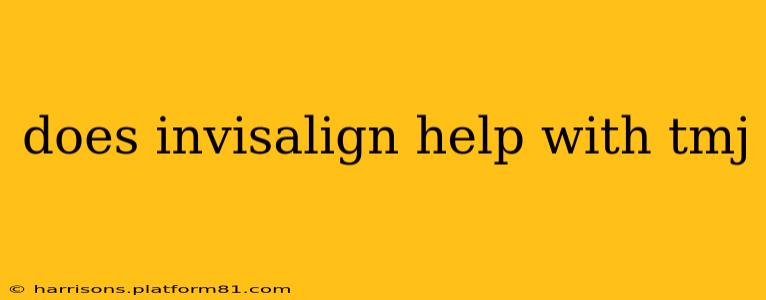Temporomandibular joint (TMJ) disorders are a common source of facial pain and discomfort. Many people wonder if orthodontic treatments, like Invisalign, can alleviate TMJ symptoms. The answer isn't a simple yes or no, and it depends on the underlying cause of your TMJ disorder. While Invisalign can indirectly help in some cases, it's not a direct treatment for TMJ. Let's explore this further.
How Does TMJ Develop?
Before diving into Invisalign's role, it's crucial to understand what causes TMJ disorders. These disorders affect the temporomandibular joints, which connect your jaw to your skull. Several factors contribute to TMJ problems, including:
- Bruxism (teeth grinding or clenching): This is a frequent culprit, putting excessive stress on the jaw joints and muscles.
- Misalignment of the teeth and jaw: Malocclusion (improper bite) can strain the TMJ.
- Arthritis: Degenerative joint diseases can affect the TMJ, leading to pain and inflammation.
- Trauma to the jaw: Accidents or injuries can damage the joint.
- Stress and anxiety: These can exacerbate TMJ symptoms through muscle tension.
Can Invisalign Help with TMJ Symptoms?
Invisalign, as a teeth-straightening system, primarily addresses malocclusion. Therefore, if your TMJ problems stem from a misaligned bite, Invisalign might indirectly help by improving jaw alignment and reducing strain on the temporomandibular joints. This improvement can lead to a reduction in pain and discomfort for some individuals.
However, it's important to note that Invisalign isn't a cure for TMJ. If your TMJ problems are due to bruxism, arthritis, or trauma, Invisalign alone likely won't resolve the issue. In such cases, other treatments are necessary.
What are the other treatment options for TMJ?
Various treatment options exist for TMJ disorders, depending on the severity and underlying cause:
- Mouthguards or splints: These can help protect teeth from grinding and reduce strain on the jaw joint.
- Pain relievers: Over-the-counter or prescription medications can manage pain and inflammation.
- Physical therapy: Exercises and stretches can help strengthen jaw muscles and improve joint mobility.
- Medications: Muscle relaxants, anti-inflammatory drugs, and sometimes even antidepressants might be prescribed to help manage symptoms.
- Surgery: In severe cases, surgery may be considered as a last resort.
Does Invisalign worsen TMJ?
While Invisalign can sometimes improve TMJ symptoms, it's crucial to consult your dentist or orthodontist. In some rare cases, improper treatment or an unsuitable bite correction could potentially exacerbate existing TMJ issues. Open communication with your healthcare provider is essential to avoid any negative effects.
How can I know if Invisalign is right for me and my TMJ?
A thorough examination by both an orthodontist and a dentist specializing in TMJ disorders is crucial. They can assess your specific situation, diagnose the cause of your TMJ pain, and determine if Invisalign is an appropriate treatment option or if other therapies are more suitable. They may also conduct imaging studies such as x-rays or MRI scans to get a clearer picture of the condition of your TMJ.
Will my insurance cover Invisalign for TMJ?
Insurance coverage for Invisalign, or any TMJ treatment for that matter, varies widely depending on your specific plan and the diagnosis. It's best to check directly with your insurance provider to understand what's covered. The diagnosis of TMJ disorder needs to be clearly established for insurance purposes.
Conclusion
In summary, Invisalign can be a beneficial adjunct to TMJ treatment in certain cases, particularly when misaligned teeth contribute to the problem. However, it's not a standalone cure for TMJ disorders. Always consult with your dentist or a TMJ specialist to determine the best course of action based on your individual needs and condition. Remember that a comprehensive approach, potentially combining Invisalign with other therapies, may be the most effective way to manage your TMJ symptoms.
